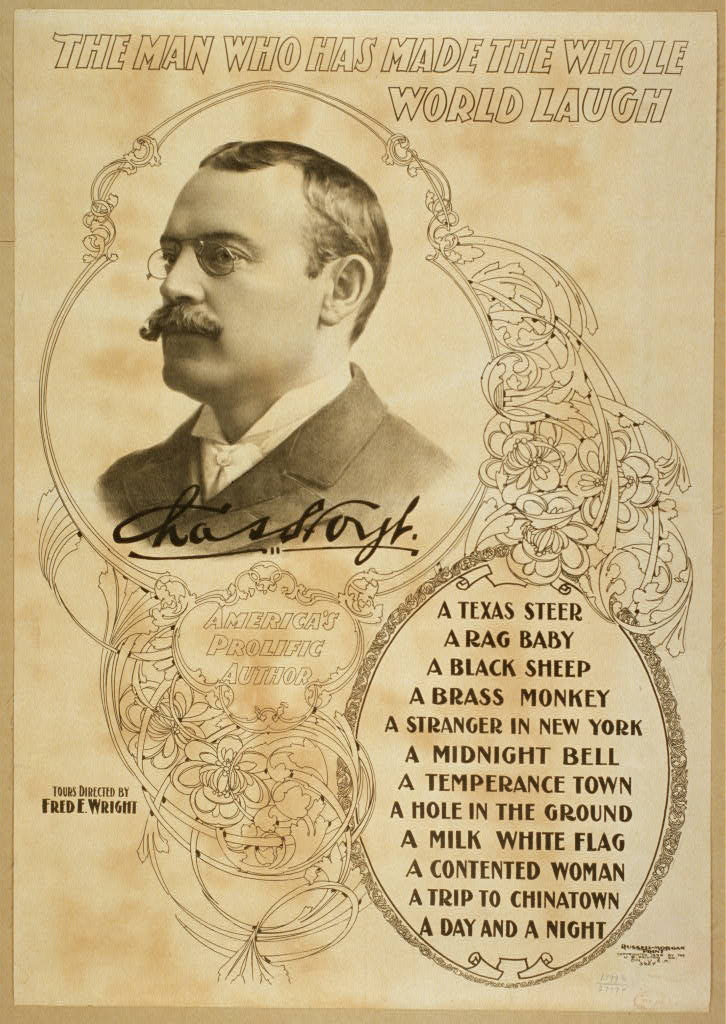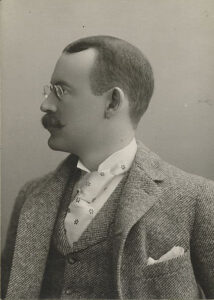Charles Hale Hoyt (1859-1900) was one of the most beloved American playwrights of his time, specializing in “farce comedy,” early models of American musical comedy. He was a product of New England, and his comedies played well in small towns across the country. His biggest hit was A Trip to Chinatown (1891), in which young couples are separated from their chaperones with amusing results. From this show came three songs still known today–“After The Ball,” “Ruben and Rachael,” and “The Bowery.”
He was elected to The Lambs 24 Feb 1890 at the peak of his fame. While his popularity never dimmed, his career was later sidetracked by family tragedies. Hoyt was named the first Immortal Lamb when the honors were created in 1933.
He was born 26 July 1859 in Concord, New Hampshire, to George Washington Hoyt and Martha Ann Hale. His father ran a hotel and later worked in the railway mail service. In 1868 the family moved to Charlestown, New Hampshire, where Hoyt attended private school. His mother died when he was nine years old. Hoyt finished his education at the Boston Latin School.
Hoyt pursued a degree in law, reading for New Hampshire Supreme Court Chief Justice Edmund Cushing. He abandoned the profession and tried different careers. He went to Colorado and worked on a cattle ranch. He returned east and Hoyt entered journalism with the St. Albans (Vermont) Advertiser and later with the Boston Post. He was a humor columnist for five years, writing about drama, music, and sports. He rose to editor and started writing plays on the side. His first productions, Gifford’s Luck and A Bunch of Keys (1883), opened to warm reviews for the 24-year-old playwright. The shows were a modest success and he left the newspaper to become a full-time playwright and producer.
He started a production company with a brother Lamb, Charles W. Thomas; their first show, A Rag Baby (1884), was a hit at Haverly’s 14th Street Theatre in New York. The company produced traveling road companies of Hoyt plays. In 1894 the partners took over New York’s Madison Square Theatre and re branded it as Hoyt’s. He wrote 14 plays; the majority box office successes. Among them were A Trip to Chinatown (1891), A Temperance Town (1893), A Milk White Flag: And Its Battle Scarred Followers on the Field of Mars and in the Court of Venus (1894), A Black Sheep and How it Came to Washington (1896), and A Florida Enchantment (1896).

Hoyt was called New Hampshire’s first and greatest playwright. “The sparkling briskness of his plays is the characteristic of the man,” a contemporary local author wrote. “Keenly satirical yet never wounding, good humoredly witty, frank and genial, Charles H. Hoyt, like his own plays, is a New England production and New Hampshire proudly claims him as her own.”
While his Broadway career was taking off and royalties were pouring in from road company productions, he decided to return to his home state. In 1892 Hoyt entered politics and was elected to the New Hampshire House of Representatives from Charlestown. He served two terms as a representative in Concord. He was the first Democrat from Charlestown in many years, and finished his work in the legislature in 1895.
His family life was tragic; both of his first and second wives died young in childbirth, as did their newborns. In 1887 he married teenage actress Flora Walsh of San Francisco. A reporter called her, “One of the prettiest girls on the stage, and a most lovable woman.” She died of pneumonia during childbirth in 1893; the couple lost a baby girl too. During a production of Hoyt’s A Temperance Town he met actress Caroline Scales, stage name Caroline Miskel, tabbed “the handsomest woman of her time.” They wed in 1894, but the marriage would also sadly be brief. In 1898 Caroline developed blood poisoning during her pregnancy and died of Bright’s Disease during childbirth; their baby boy died a few minutes later.
His trusted friend and business partner, Charles W. Thomas, died and this drove Hoyt to bouts of heavy drinking. The multiple tragedies put a stop to Hoyt’s career and led to his forced institutionalization in Connecticut’s famous Hartford Retreat for the Insane. He was released to return home for the last four months of his life while suffering from paresis, a muscular weakness caused by nerve damage or disease. Hoyt suffered from partial paralysis. Paresis killed him at age 41 on 20 Nov 1900 in Charlestown.
Hoyt’s funeral was held at St. Luke’s Episcopal Church in Charlestown; his family had his body lay in state for the large crowd of mourners who came to pay their respects. He is interred with his family in a beautiful mausoleum in nearby Forest Hill Cemetery. He bequeathed his estate to the Actors Fund of America and he gave his house to The Lambs. It was later sold and became a public library. The Lambs commissioned a stunning oil portrait for the clubhouse by Robert Reid, a brother Lamb and noted painter.
For his generosity, Hoyt was named the first Immortal Lamb in 1933.
— Kevin C. Fitzpatrick, Club Historian
